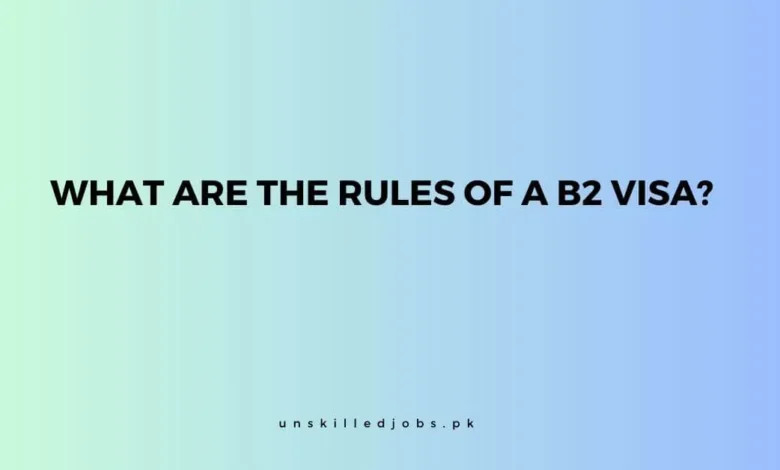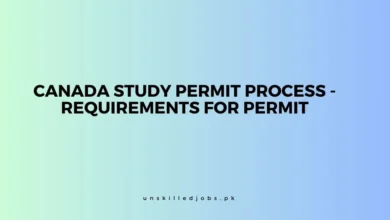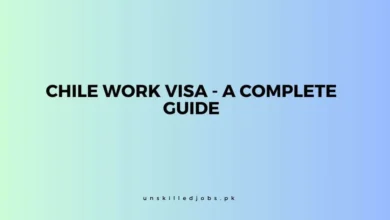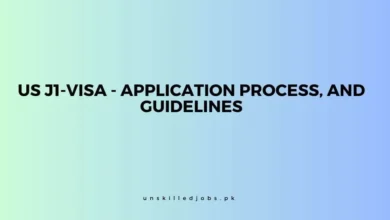What Are The Rules Of A B2 Visa?

People can visit the United States briefly for tourism, medical care, or other non-business reasons with a B2 visa, which is a non-immigrant visa. It is very important to know the rules and laws for a B2 visa in order to stay in the country legally and without any problems.
What Are The Rules Of A B2 Visa?
Purpose of the Trip
The most important thing you need to do to get a B2 visa is to show that your trip is for tourists. Whether you’re going to see famous landmarks, see family, or do fun things for fun, your goal should be to do something that isn’t linked to work or business.
Permanent Residence and Ties to Home Country
Applicants must show that they have strong roots in their home country and a permanent home that they don’t plan to leave. This can include having a steady job, owning a home, or being close to family. Consular officers need to know that you have good reasons to go back to your home country after your trip to the U.S.
Non-Business Activities
Individuals who want to apply for a B2 visa shouldn’t plan to work for a U.S. company or do business activities. This type of visa tightly forbids any work-related activities or activities that make money in the United States.
Financial Resources
One important part of getting a B2 visa is showing that you have enough money to pay for the trip. The applicants must show proof that they can pay for all of their travel, lodging, and living costs while they are in the U.S. On the other hand, if the applicant doesn’t have the money, a sponsor can show proof of financial help.
Eligibility Criteria for a B2 Visa
The United States Citizenship and Immigration Services (USCIS) sets certain requirements for people who want to get a B2 visa. To be eligible, people usually have to show that they have a good reason for visiting, that they have enough money to pay for their stay, and that they plan to go back to their home country after the visit.
Duration of Stay
One of the most important rules of a B2 visa is how long you can stay. When they come to the United States, people with a B2 visa are usually only allowed to stay for six months at a time. However, the Customs and Border Protection (CBP) worker at the port of entry decides how long you can stay. It is important to stay for the allowed amount of time to avoid any legal problems.
Prohibited Activities
Although someone has a B2 visa, they are not allowed to do certain things that are not related to the reason for their visit. Some of these things are working without permission, signing up for school programs, and doing any kind of paid work. Breaking these rules can lead to serious problems like being deported and not being able to get a visa in the future.
Extension of Stay
People may be able to ask for an extension of their stay beyond the initial period allowed on their B2 visa in certain situations. But requests for extensions must be sent to the USCIS before the approved stay ends, and applicants must give strong reasons for needing an extension, like medical emergencies or things that were not planned for. Future ineligibility for a visa.
Compliance With Immigration Laws
People with a B2 visa must strictly follow all U.S. immigration laws and rules. As part of this, they must keep their immigration status good during the visit, leave the United States on time when their authorized stay ends, and follow any reporting rules set by the USCIS or CBP.
Conclusion
People who want to visit the United States for medical or tourist reasons need to know the rules and laws that apply to a B2 visa. Following the rules for eligibility, staying within the allowed time, not doing things that aren’t allowed, and following immigration laws can help visitors have a smooth and enjoyable time in the country.
Frequently Asked Questions
-
What is the primary purpose of a B2 visa?
The B2 visa is for people who want to visit the U.S. for reasons other than work, like vacation or medical care. It’s not meant to be used for work or business.
-
How long can you stay in the U.S. with a B2 visa?
With a B2 visa, you can usually stay for up to six months. The Customs and Border Protection (CBP) worker at the port of entry will decide, though, how long you can stay. To escape legal problems, it’s important to stick to this deadline.





